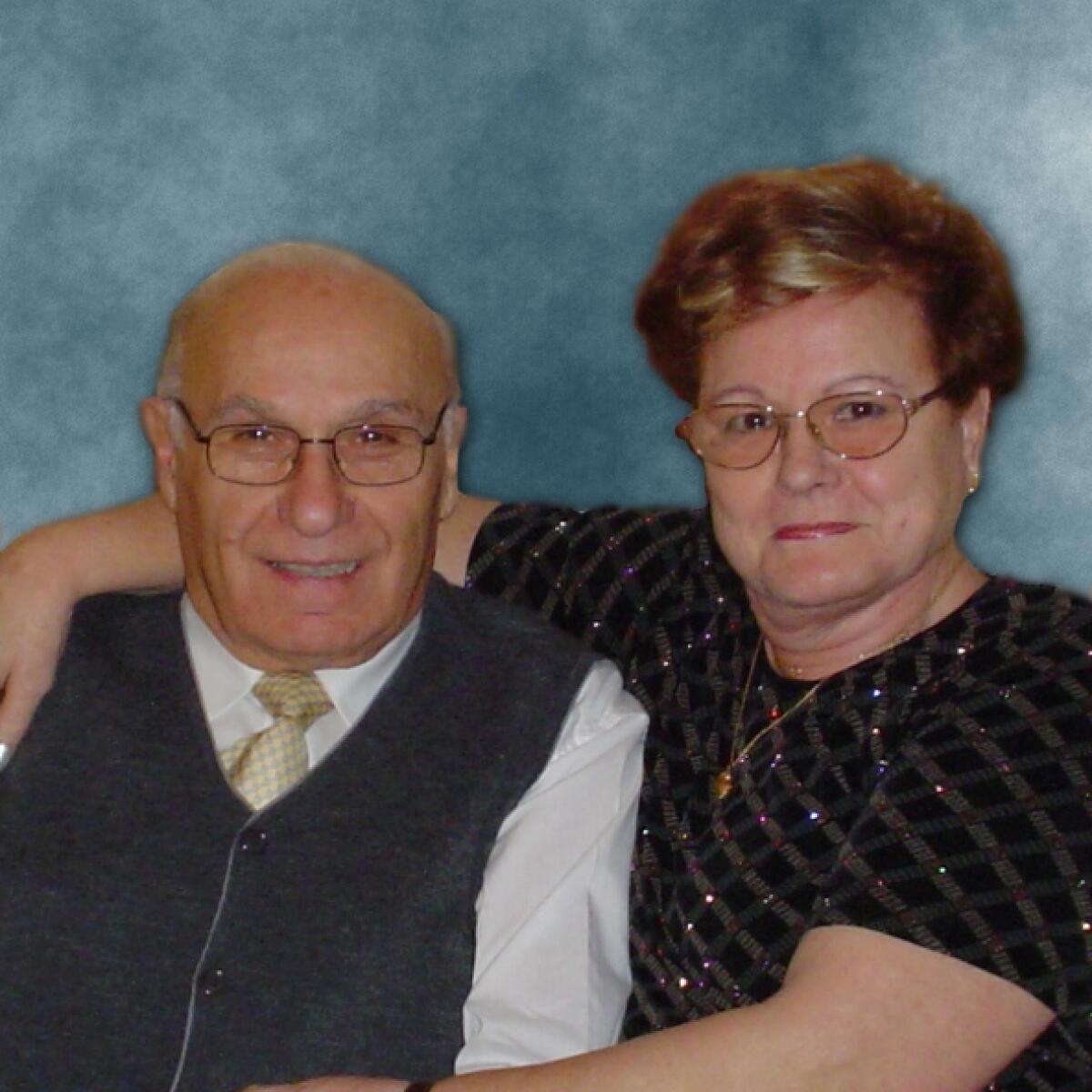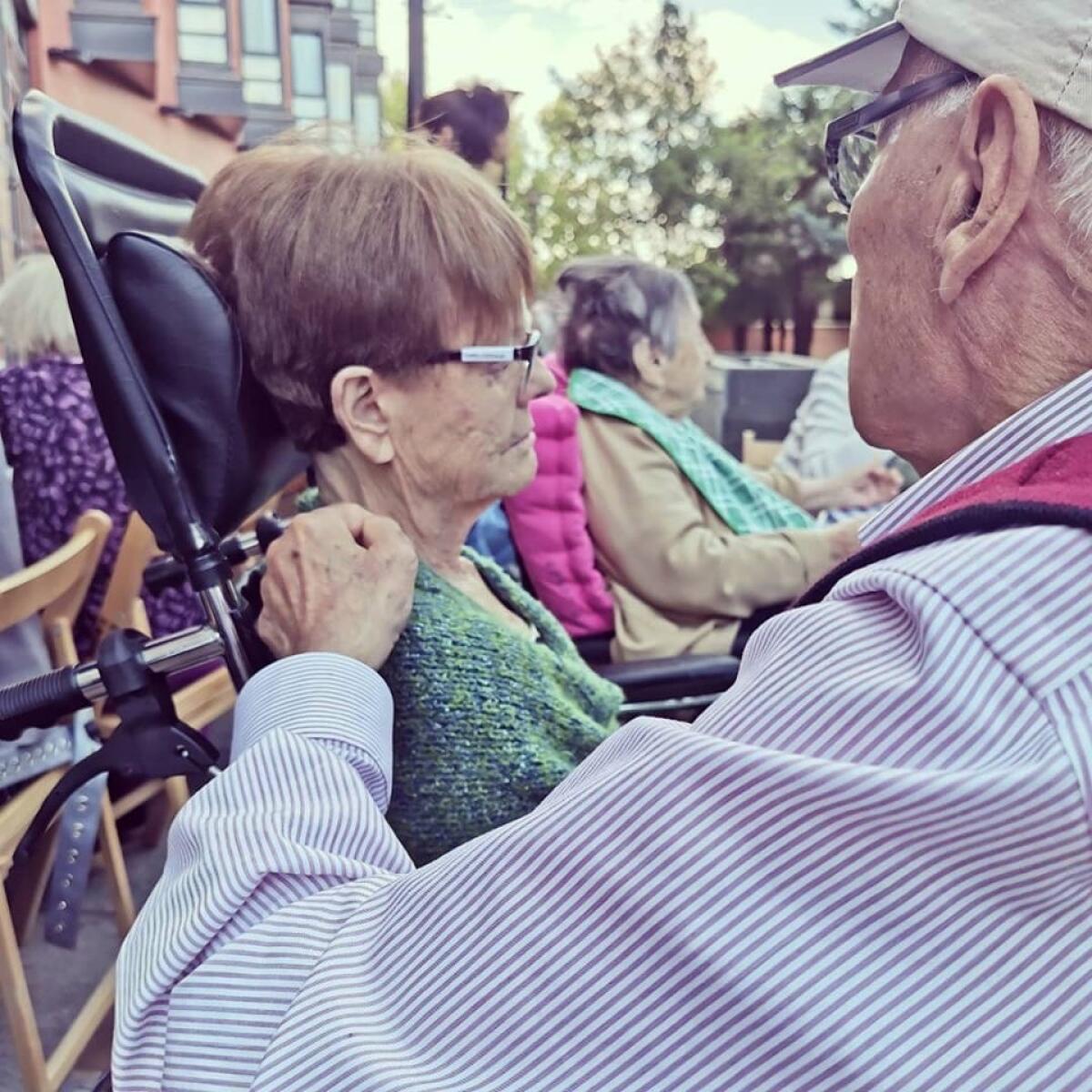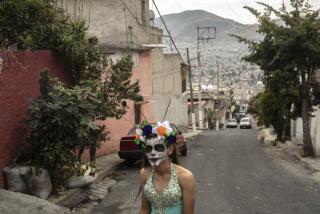He never missed a visit despite her memory loss. Then the coronavirus scare ended visits forever

- Share via
Isabel, open your eyes, Ramón Hernández pleaded with his wife. Please, open your eyes.
For the record:
6:12 a.m. April 1, 2020An earlier version of this article incorrectly said relatives attended a Mass in memory of Isabel Costales.
6:12 a.m. April 1, 2020
Rarely did she heed his requests because of her dementia. She sat quietly in her wheelchair, face blank and eyes closed, while her husband sat beside her, holding her hand. They stayed that way for hours, until staff at the nursing home in Spain politely asked Hernández to leave before her lunchtime.
He never missed a day. Every morning, even at age 88, he walked the 12 minutes from his apartment in west Madrid — the apartment he and Isabel Costales, 86, had shared for half a century — to the nursing home, Monte Hermoso.
But in early March, Monte Hermoso closed its doors because of the coronavirus. Then an elder care watchdog association, Defensor del Paciente, filed a complaint to a Madrid court asking for an investigation of Monte Hermoso amid widespread reports of mistreatment and poor conditions at multiple facilities. The association also requested that the attorney general investigate all such facilities, and the country’s top prosecutor announced an investigation.
Costales, who had tested positive for the coronavirus, died March 20. Officials from Monte Hermoso have declined to comment on the case or the facility’s treatment of residents.
Hernández learned from a granddaughter that his partner of nearly 60 years had died. He felt awful that he had not been with her.
“I am not alone,” Hernández said in a phone interview from his apartment. “I am extraordinarily alone.”
The coronavirus had killed more than 8,200 people and total cases exceeded 94,000 in Spain as of Tuesday. The country has opened an ice rink to hold corpses, and waiting lists for burials are days long.
Hernández never saw his wife’s body. Costales was cremated, but Hernández had yet to receive her ashes.
He cannot read a book without thinking of her. He cannot watch television without thinking of her. In everything, he sees her: Isabel, Isabel, Isabel.

The neighbors drop off bread. A woman from the city’s social services agency comes twice a week to prepare his meals. Once, Hernández tried to fry eggs, but they turned out badly.
He has resigned himself to sitting and spending whole days staring at her photos.
“It’s hard to say, but I cry,” he said.
The 27-member bloc struggled to set continent-wide policies even as most of Italy, France and Spain were on lockdown.
Costales had survived war, dictatorship and cancer. She was born in Madrid two years before the start of the Spanish Civil War, a conflict that would kill about 200,000 soldiers and result in a 40-year, right-wing dictatorship. Her husband-to-be was born in Barcelona a few years earlier.
Hernández and Costales met at a Madrid house party. She was 16 or 17; he was 18. They loved those parties. The hosts would spin records while the partygoers danced and drank wine mixed with soda.
Something about Costales caught Hernández’s eye. She was easygoing with a big smile. They danced that first night and kept dancing. On Sundays, they went to Metropolitano and Las Palmeras. They did the double step, rumba, foxtrot. They married in December 1960.
During the dictatorship of Gen. Francisco Franco, opportunities in Spain were hard to come by. The war had laid waste to the country and its economy. Thousands of Spaniards fled north to find work.
Hernández was one of them. He and a friend went to Frankfurt, Germany, in search of factory jobs. They slept in a train station until they found work making car and boat parts. Costales later joined him, sewing pants and welding cables for money.
After their two daughters were born, the couple longed to return to Spain. When they did, in 1967, Costales dedicated herself to the family, keeping the apartment immaculate. Hernández worked as a bus driver, then an ambulance driver.
Their children had children, and those grandchildren would come over for lunch in the apartment. Costales loved to listen to music with them.
In their retirement, the couple traveled the Iberian Peninsula together. Mallorca, Ibiza, Portugal. Trips Hernández will never forget.
Two years before COVID-19 would upend the world, Costales began acting out of character. Eventually, she was taken to a hospital and diagnosed with vascular dementia.
In total, the family tried three nursing homes. The first two were 25 miles from Madrid. Every morning, Hernández would take the metro and a bus — an hour’s journey — to see her.
The visits were too short. He would return to their apartment and pass the afternoons alone.
Last year, Hernández moved her to Monte Hermoso, where she would be closer to him. He kept up the routine, walking to see her every morning — until the morning when he could not.
They were apart 11 days. He was worried sick. He had lived with the hope she may get better. He never saw his wife’s body.
Now, there is nothing he can do but sit with his sadness.
“This is extreme solitude,” Hernández said. “The poor thing. She suffered life’s worse illnesses.”
The days are mostly the same. He speaks to his family on the phone. He waits for his neighbors to bring bread. He wishes desperately that he could give Costales one last kiss.
Bernhard is a special correspondent.
More to Read
Sign up for Essential California
The most important California stories and recommendations in your inbox every morning.
You may occasionally receive promotional content from the Los Angeles Times.











